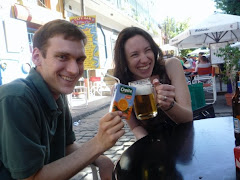Sam held a training for his teaching counterparts on using the new technologies he was able to help them get and set up as part of the grant he won for his school. (He even was able to convince his counterparts to come in to school on a weekend for the training!) His classes have been able to benefit from the new English classroom, gaining the joy of hearing all about Mr. Jolly, a major figure in the new lower-grade English textbooks. He has had some frustrations and setbacks in the project implementation, but even with these difficulties, it seems that all of his counterparts are getting into using the equipment. Further, it sounds like the ability to use the AV components of the textbooks (however diabolically evil some of the songs or jazz chants may be) has really been a boon for the students. Sam should be able to finish up all the final reporting paperwork for his grant project soon and be able just to work to see that it continues to be used and useful.
I’ve been working to wrap up my grant-recipient project that started over the summer, too. Since late July I have been holding a series of training sessions on various women’s health topics for a group of women and girls who consistently came to my fitness club. The trainings were all based on the peer education model and with the goal of making all of the participants peer educators, so they could then in turn share the information with their friends, families, relatives and neighbors. I envisioned it as a fairly simple project. I’d get the women together, show them one of the lectures from the Health Education Lecture Series, run through an activity with them from our Companion Guide or one of the other resources the Life Skills Committee has and that would be that. Ten trainings would be no problem to just knock right out.
Marianna, leading one of the training sessions

So it took us from the end of July through the end of October, but Marianna and I led 10 hour-plus-long sessions in which we taught our group about nutrition and physical fitness, emotional health and self-esteem, hygiene and communicable diseases, peer education, women’s health, reproductive health and STDs, HIV/AIDS, diabetes, high blood pressure and heart disease, and taking health peer education into the community. The women in the group shuffled around their busy schedules to attend, and all came to nearly every session. They all said they were sad to see the trainings end, but they learned a lot, and I’m really proud of them and grateful for their hard work and dedication.
Their roles as peer educators in our town (the goal I had in mind from the get-go) got a head start and a boost through some luck and some leftover money in the VAST budget. I was able to get an addition to my initial grant to take a group of women to a health clinic an hour’s drive away, where women aged 25-60 can get free gynecological exams and those aged 40-70 can get free mammograms. The clinic’s facilities and equipment were paid for and donated through American and European organizations and donors and everything is state-of-the-art, and no one in Akhalkalaki had ever heard of it. As their final assignment for the training, the women had to run a peer education session on women’s health for up to three other women, then they had to bring those women with us to the clinic for checkups. I expected a group of about 30 (of which 11 would be the original program participants). Instead, I took 43 women on two days last weekend for a full day of screenings. It was incredible, to be able to see how the women from the training program stepped up and helped get enough other women over their fears of doctors or traveling to another town.
Director of the Democrat Women's Organization in Akhaltsikhe, Marina, giving a presentation to the group of women before the health screenings began
The grant money made it possible for me to get a bus both days for transportation, to give the organization an honorarium for providing their services on days when they normally are closed (they usually only work Monday through Friday, but opened on Saturday and Sunday to accommodate the size of our group and to be dedicated just to us), and to buy coffee, tea, cookies and lunch for all the ladies. It was a small grant overall (the total budget for both the training and the trips was just around $1800), but I think it had a big impact. And as we get closer to closing our service here in Georgia (just under 8 months to go!), it’s boosts like these projects that really help us feel like we’ve been doing the right thing.
The group of women, waiting for their health screenings
And even though the clock is starting to tick and our PC service is starting to wrap up, we're both excited about trying to get in a few more projects and activities. I think we've got some final bursts of energy (and enough time left) for another few initiatives. We'll try to keep you posted on what we're up to, and not get too caught up in the whirlwind of our last bit of Peace Corps.








Melissa--that project sounds amazing!!! I'm so glad to hear that the women liked the DVD too!
ReplyDelete